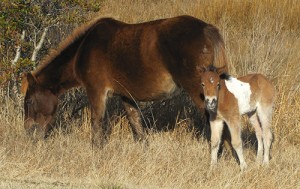
ASSATEAGUE — Local residents and visitors to Assateague will have the opportunity to name a recent addition to the barrier island’s herd of wild horses with the opening this week of a charitable raffle for the rights to permanently affix a new moniker on the pinto filly born last December.
The Assateague Island Alliance (AIA), the private sector friends group of the Assateague Island National Seashore, announced this week it is now holding a raffle for the rights to name the “Christmas surprise” born to the herd of wild horses on the barrier island during the holidays in late December. The foal is currently known only as N2BHS-AL, but the eventual raffle winner will have the opportunity to put a less formal name on the horse.
In the mid-1970s, the National Park Service began naming new foals in the Assateague herd with an alpha-numeric code to help track the lineage and ancestry of the wild horses and identify to which sub-herd they belong and which areas of the island they frequent. For example, the new foal born in December was birthed by N2BHS-A, more commonly known now as “Gokey Go Bones.” Although Gokey Go Bones was often seen with N2BHSX, or Jester, while she was pregnant, the coloring of the new foal suggests the sire is likely N9BM-E, or Yankee.
For years, the AIA has held naming rights for the new foals. In the past, AIA has held online auctions for naming rights and in other cases has held charitable raffles, as in this case. The raffle started this week and will go on through Labor Day with the drawing planned for Sept. 1 at Mackey’s. The donation is $20 per ticket and only 500 tickets will be sold. The winner does not need to be present at the drawing to earn the rights to name the new foal and the name is subject to approval and may not include any licensed or copyrighted content. To purchase tickets online visit the AIA website at www.assateagueislandalliance.org.
The birth of the new foal in December was a pleasant pre-holiday surprise for Assateague Island National Seashore staffers, largely because they did not know Gokey Go Bones was even pregnant. Assateague officials regularly collect the horse’s feces and test for hormones that reveal if any of the horses are pregnant, similar to a human pregnancy test. However, because the mares carry the foals for 11 and a half months, Gokey Go Bones may not have been showing any hormone changes when her feces was tested.
The birth of the new foal brought the island’s native horse population at that time to 101, which is close to the ideal range of 80 to 100. It was the second foal born in 2013, the first coming last May. With just two foals birthed last year, the number came in lower than the statistical average. While three to five foals are born in a typical year, an in-kind number drop off due to old age, illness or other natural or manmade factors. The mortality rate is around three to five per year, which coincides with the typical birth rate.
In the interest of managing the size of the herd, which, if left unchecked would overtake the barrier island and gobble up the very resources the wild ponies need to survive, the National Park Service several years ago began a contraceptive program for the mares in the herd. The mares are injected with a non-invasive contraceptive to prevent multiple births in an effort to maintain and ultimately shrink the size of the herd to its manageable threshold. In the interest of maintaining the gene pool of the famous wild ponies, believed to be descendants of domesticated horses placed on the island 300 years ago, each mare is allowed to birth one foal before being put on the contraceptive program.
